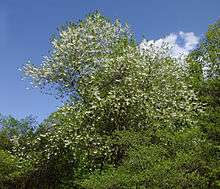Halesia tetraptera
| Common silverbell | |
|---|---|
| | |
| Scientific classification | |
| Kingdom: | Plantae |
| (unranked): | Angiosperms |
| (unranked): | Eudicots |
| (unranked): | Asterids |
| Order: | Ericales |
| Family: | Styracaceae |
| Genus: | Halesia |
| Species: | H. tetraptera |
| Binomial name | |
| Halesia tetraptera L.[1] | |
Halesia tetraptera, commonly known as the common silverbell[2] or mountain silverbell[3] (or Carolina silverbell; syn. Halesia carolina auct. non L.),[4] is a species in the family Styracaceae, native to the southeastern United States. It is cultivated as an ornamental tree.
Description
It is a small deciduous tree growing to 10 m tall. The leaves are ovate to lanceolate, 5–16 cm long and 4–7 cm broad. The flowers are 1–2.5 cm long, with a four-lobed white corolla. The fruit is a dry drupe 4 cm long, with four wings running along its length.[2][5][6]
Range
The species is found in scattered populations over much of the eastern United States, as far north as West Virginia, south to northern Florida, and west to Oklahoma. But it is thinly distributed over much of its native range, and is becoming rare in many areas.[7]
Varieties
There are two varieties of H. tetraptera:
- Halesia tetraptera var. tetraptera – Common silverbell
- Halesia tetraptera var. monticola (Rehder) Reveal & Seldin[8][9] – Mountain silverbell
The last taxon is much larger, up to 20–39 m tall, with larger leaves up to 20 cm long and flowers up to 3 cm long.[10]

Trunk 
Flowers  H. tetraptera var. monticola
H. tetraptera var. monticola
References
| Wikimedia Commons has media related to Halesia tetraptera. |
- ↑ "Halesia tetraptera L.". The Plant List (2013). Version 1.1. Retrieved 16 September 2015.
- 1 2 KY State Nature Preserves Commission: Halesia tetraptera
- ↑ "Halesia tetraptera". Natural Resources Conservation Service PLANTS Database. USDA. Retrieved 9 May 2015.
- ↑ Germplasm Resources Information Network: Halesia tetraptera
- ↑ Huxley, A., ed. (1992). New RHS Dictionary of Gardening. Macmillan ISBN 0-333-47494-5.
- ↑ Bioimages: Halesia tetraptera
- ↑ Geographic Distribution: Halesia tetraptera (Carolina Silverbell)
- ↑ Germplasm Resources Information Network: Halesia tetraptera var. monticola
- ↑ "Halesia tetraptera var. monticola (Rehder) Reveal & Seldin". The Plant List (2013). Version 1.1. Retrieved 16 September 2015.
- ↑ Rushforth, K. (1999). Trees of Britain and Europe. Collins ISBN 0-00-220013-9.